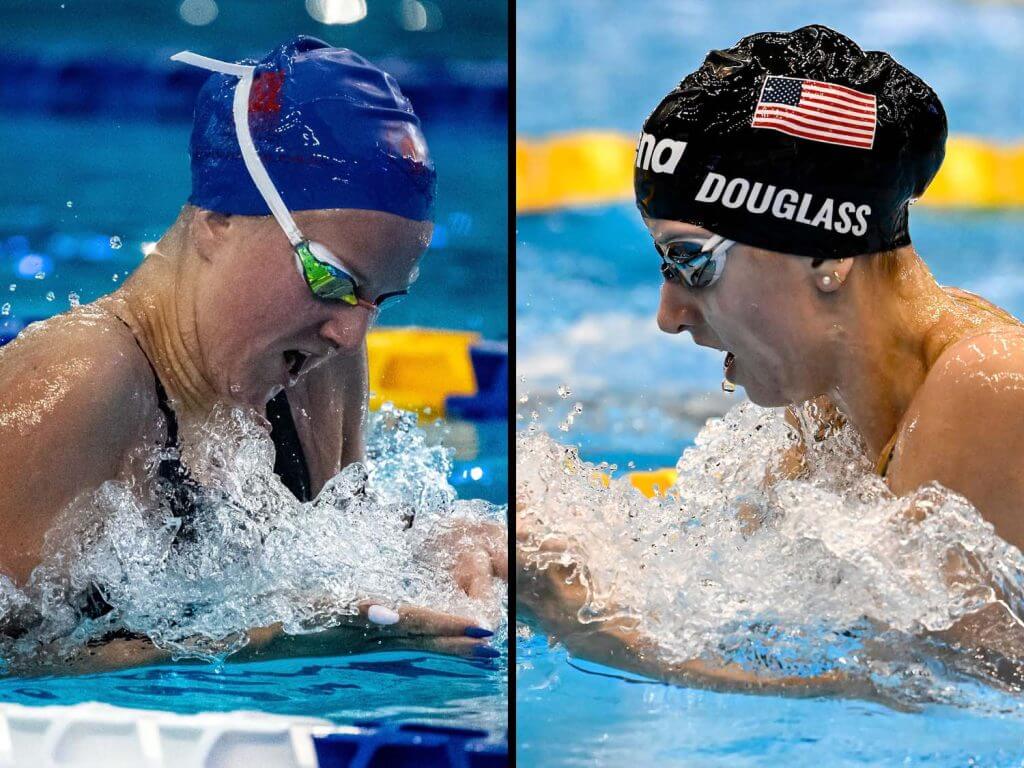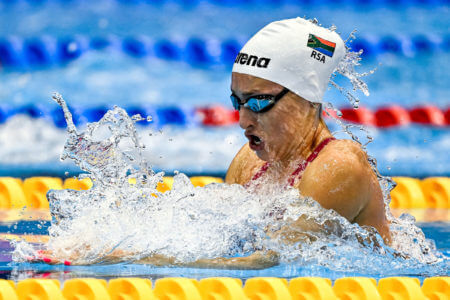Could It Take Sub-2:20 For 200 Breaststroke Olympic Podium?

Could It Take Sub-2:20 For 200 Breaststroke Olympic Podium?
Before it was finally cracked, the 2:20 barrier had been closely pursued fore more than six years, with Australia’s Leisel Jones and the United States’ Rebecca Soni and Canada’s Annamay Pierce all exchanging the world record and getting closer to the mark. But at the London Olympics, Soni finally got the job done. She went 2:20.00 in the semifinals to reclaim the world record and then finally cracked the barrier the next night, clocking 2:19.59 for Olympic gold.
The next year, with Soni’s international career over, she lost her world record to Denmark’s Rikke Moeller Pedersen in the World Championships semifinals, and then Yuliya Efimova also surpassed Soni’s previous world record on the way to a world title. However, that did not open the floodgates for more and more swimmers to get under the mark. No one broke 2:20 at the 2016 Olympics, and in the five most recent World Championships finals, only one has featured a sub-2:20 performance, when Efimova won gold in 2017. In the other four meets, 2:20s, 2:21s and 2:22s have been sufficient for gold.

Tatjana Schoenmaker — Photo Courtesy: Andrea Masini / Deepbluemedia / Insidefoto
It was not until the 2021 Olympic final when two swimmers broke 2:20 in the same race. South Africa’s Tatjana Schoenmaker, who had burst onto the scene over the previous few years, nearly broke the world record in both prelims and semifinals, but when gold was on the line, she took control of the race and became the first woman ever to get under 2:19, clocking 2:18.95. Meanwhile, American Lilly King won an international medal in the 200 breast for the first time as she clocked 2:19.92 for silver.
In two-and-a-half years since Tokyo, two additional women have reached the teens in the 200 breast. One of them is a teenager, albeit one absent from the international stage for the past two years because of reasons beyond her control. In April, 18-year-old Russian Evgeniia Chikunova obliterated Schoenmaker’s world record with a time of 2:17.55.
Chikunova had placed fourth in the Tokyo final at age 16, but Russian athletes were widely banished from international racing after their country’s invasion of Ukraine. The International Olympic Committee and World Aquatics have introduced pathways for Russians to potentially compete as “Individual Neutral Athletes,” but it is currently unclear how the situation with Chikunova specifically will play out.
Then there’s American Kate Douglass, who has built an impressive list of accomplishments in the 200 breaststroke in recent years before fully breaking out last weekend. Douglass did not even swim the 200 breast at the 2021 U.S. Olympic Trials, a meet where she focused on the sprint freestyle events, 100 butterfly and 200 IM, but her debut in the event at the 2022 World Championships paid off with a silver medal. Later that year, she earned a short course world title, and in 2023, she earned 200 breast silver, finishing just a half-second behind Schoenmaker despite racing minutes after the 100 free final.
Now, Douglass is the newest member of the 2:19 club after skipping over 2:20 altogether. At the Pro Swim Series in Knoxville, Tenn., Douglass raced King, her primary American rival in the event, and even though King typically takes the race out hard and forces Douglass to chase, the roles were reversed this time, with Douglass almost two seconds ahead at the halfway point. Douglass came in at 2:19.30, almost two seconds quicker than her previous best time (2:21.22) and three tenths quicker than Soni’s American record, which had lasted 12 years since London.
Douglass achieved her performance immediately after grueling holiday training, so it makes sense that she can go quicker when fully rested at a major competition, perhaps as soon as next month’s World Championships in Doha. Now, imagine a scenario where Schoenmaker can approach her best mark by the time the Paris Olympics come around, Douglass remains on top form and Chikunova is allowed to compete. In that case, yes, it might take a sub-2:20 performance just to earn a medal.
Compare this scenario to recent developments in the women’s 400 free, where Katie Ledecky was alone atop the event for years until the emergence of Ariarne Titmus and Summer McIntosh. Before last year’s Worlds, no race in history had seen more than two women break 4:00, but in Fukuoka, four women went under the barrier, with a lifetime best from Erika Fairweather denying McIntosh, who entered the race as the world-record holder, a medal of any color.
That could happen in the 200 breast as well, with the likes of King, the Netherlands’ Tes Schouten and Australia’s Jenna Strauch among the other top challengers for medals in Paris, with six months left for further contenders to emerge. At this point, it would be surprising if we do not see the fastest 200 breaststroke race in history.



